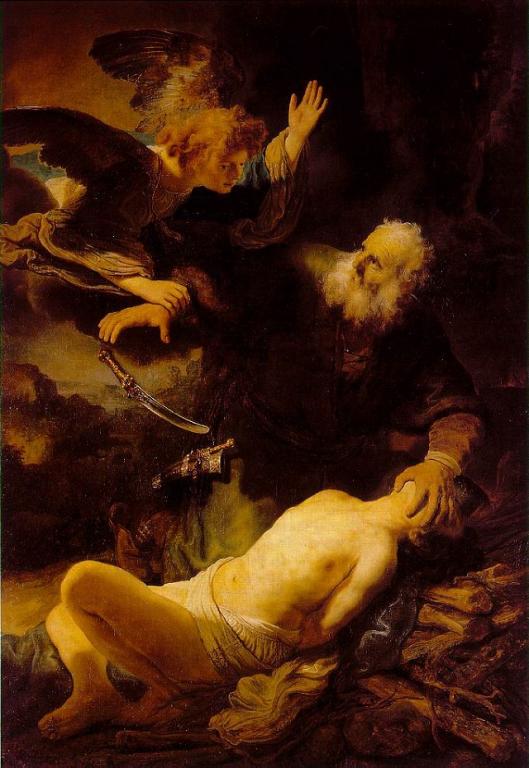
Words of the late Dr. Jan Schreurs will be in blue.
*****
If you want a Biblical example, look at the story of Abraham about to kill Isaac (Gen. 22). God, of course, would not command Abraham to commit a sin. In a letter to a theologian, I entertained the following positions: (1) Child sacrifice was not a sin in those days;
It was a sin under Old Testament Law, but this was before the Law was given to Moses. Abraham’s very agony would lead one to believe that he understood the wrongness of it; hence the existential agony. But in this instance Abraham was tested in his obedience to God in the face of the most unimaginable conflict in his own mind. In effect, God was seeing if Abraham loved Him more than even his own flesh and blood (for Abraham’s sake, not God’s — God knew what Abraham would do all along).
There are numerous trials in life that make no sense to us, and test our faith and trust in God. These can all work for good, if we allow them to be used in our life and spiritual journey. Catholicism is the only religion which gives a cogent and sensible reason for the place and purpose of suffering in this life. That gets into very deep waters, though, so I ask that we just let that lie.
(2) It was a sin only if done other than by direct command from God;
Death itself is a curse — one that God Himself was willing to experience on the Cross in order to save humanity. Whatever God is willing to — in effect — “dish out” He is willing to take upon Himself as well. This is a fact conveniently overlooked in the ubiquitous attacks with regard to the “problem of evil” . . .
(3) It was a sin and Abraham should have told whoever asked him to kill his son to go to hell because that’s where he came from.
Abraham had already had a relationship with God; that was prior to this incident, so it was a matter of choosing the God he knew, even though it seemed unimaginable that He would request such a thing. (Gen 22:12). The New Testament also tells us that Abraham believed in God to such an extent that he thought God would raise Isaac from the dead, since He had already promised descendants through him (Heb 11:17-19). Of course, the whole incident is a profound metaphor of Jesus’ death on the Cross: God the Father’s Son.
The theologian did not reply. So you are better than he is.
What can I say? But that should tell you something: if a mere relatively uneducated layman such as myself can at least take a crack at your objection (which is a good one), how “irrefutable” can it be?
You seem to take position (2).
God could conceivably judge a person with death. But that doesn’t seem to apply in this instance.
But most of those who practiced child sacrifice thought it was because their gods demanded it. So it was not a sin for them. Only those who, knowing better, just pretended that their gods had commanded the sacrifice were sinning.
These “gods” did not reveal and prove themselves like Yahweh did. See, for example, the confrontation between Elijah and the false prophets of Baal on Mt. Carmel (1 Kings 18:20-40). God proved Himself through prophecies that came true, and urged the Hebrews to reject false prophets and their supposed “gods.”
To put it in today’s context, suppose a pregnant woman claims that God ordered her to abort. What is the Church’s standard answer? God would never do that and the woman is mistaken. It wasn’t God who ordered her to abort.
Correct; because revelation and Church history are very clear as to this sin. God won’t contradict His revelation or the constant teaching of the Church He set up and guides.
It was either the devil posing as God or wishful thinking on the woman’s part. Diabolical possession or neurological disorder.
Quite plausible . . .
Unless (1) is true, Abraham faced the dilemma of (3). Was it God talking or was it the devil. [Neurological disorders were unknown and untreated in those days.]
That’s why God, knowing all that, would not confuse Abraham by asking him to commit what would be a sin if it wasn’t God who asked. As you see, whether God can make a sin a virtuous act isn’t really material to the argument. Let’s say God can do that. He still would not do it.
This overlooks the simple fact that God — knowing all things including the future — knew how Abraham would respond before He even asked him to offer Isaac. Therefore, knowing that, He certainly would and could ask such a thing, since He knew it would accomplish His purpose (to strengthen Abraham’s faith and to afford him the opportunity to really see for himself whether or not he fully trusted God).
Again, it seems that you assume a deistic god who doesn’t even know the future, and who thus cannot plan His creation according to his providence and complete sovereignty.
But the fact that Abraham believed God would simply raise Isaac again underscores the very argument I have been making: viz. that God is the Creator, the God of Life, who has the prerogative to let anyone live or die whom He desires to live or die. Abraham, knowing that, was able to exercise faith (albeit to a truly extraordinary degree — which is precisely why he is so revered by three world religions, and the writer of Hebrews, as an example of profound faithfulness).
Even God cannot do that if he is logical. Not even to test Abraham’s loyalty.
He certainly can. You demonstrate that you misunderstand the legitimate prerogatives of a Creator. This is not a matter of either sin or illogic. He has the right to do that, because we are His “property,” so to speak. But a mother doesn’t have the right to murder her unborn child, because that child is not her property (nor, of course, “her body,” as the stupid feminist rhetoric would have it — or else she has a penis if the child is male). He or she belongs primarily to God — a creation in His image — and only secondarily to the parents, as a matter of stewardship.
It is the false assumption that one human being is another’s “property” (akin to slavery) which has in part brought about the child-killing mentality we are faced with today. There is no illogic or contradiction in this at all — not even a mystery. The New Testament, by divine inspiration, gives us the entire explanation and purpose.
The property issue I discussed at great length with Fr. Frank Pavone, the International Director of Priests for Life. Frank did answer my letters for a while. And he used your property argument almost to a tee, at every occasion he had, appropriate or not. However, I have not heard or seen him use it for two years now. I doubt that my letters had anything to do with that. More likely, having gone to Rome for a while, he met some seasoned philosophers and theologians who advised against it.
If it is so weak, then go ahead and refute what I have given you above. I look forward to it. This is a very interesting and challenging discussion.
Briefly, the issue here is who “owns” the problem, not the human beings in question. The one who is responsible for the consequences of a decision is the one who has the final say in the decision. He or she is called the “owner” of the problem. Others may advise and present alternatives, argue pro and con, but the owner decides. And if you believe in free will, God won’t make that decision for the human owner of the problem. He CAN, but he will not do it.
I’m not clear as to how this applies to the Abraham/Isaac scenario. Can you please elaborate a bit? Maybe my brain is just fried by now . . .
If I understand you correctly, God can do anything he wants. Whether he CAN is not even the issue here. Whether he WILL is the issue.
Well, He will not do anything that is immoral and evil, based on the Moral Law which is grounded in Himself, in His own nature. I, of course, deny that this incident is a counter-example, as I have explained it.
And why would an omniscient God have to test Abraham’s loyalty anyway?
He doesn’t. What He does is provide an opportunity (granted, an existentially agonizing and almost incomprehensible one) for Abraham to realize the nature and extent of his own faith. Again, you don’t seem to understand why God does what He does (and the only reason anyone understands it to any extent is because of revelation).
I’m glad we agree that God is not testing Abraham’s loyalty. So when Gen. 22 says that God put Abraham to the test, we are either mistranslating or misunderstanding (as I am apparently) unless we interpret it the way you do. That’s because you happen to know revelation when you see it, and those who disagree with you don’t? [:-)]
Hardly. Rather, it is because of the constant Hebraic poetic use in the OT of anthropomorphism with regard to the actions of God. For our readers (and maybe for you :-), that word means that God is portrayed as if He were a mere human being, so that we can be helped to understand the things He does from our own limited human perspective. That makes perfect sense to me.
An infinite God has to somehow communicate His nature to created, finite, sinful, fallen human beings. In so doing, He must “lower” himself to a human level, so to speak (just as you would in teaching a kindergartener, or a person with a very low IQ, or brain damage, or a dog or monkey or guinea pig, etc.). Otherwise, His message simply will not get through.
Note also that Abraham traveled three days to obey God’s command. Surely, even an omniscient God would know after two days that Abraham intended to obey? :-).
Of course. God is outside of time. Your posed questions only show that you operate under incorrect assumptions about God and Christian theology which would never be an issue for us.
If God is outside time, how can he interfere inside time?
Because time itself is His creation. The way C. S. Lewis put it, God is like the author of a book. The book and its characters represents time. God can “interfere” with any character at any “time” — as He so wills, because He is completely outside of the book and what is in it — in fact, He created all of it. “Transcendence” by definition means that God is superior to creation.
Time comes under His omnipotence and His nature as the Creator; it poses no problem for Him to enter into it (e.g., the incarnation), anymore than it does for an author changing something in his book. St. Augustine dealt with time 1600 years ago, as I’m sure you are aware.
And didn’t Einstein show that time itself is a relative concept? That was another proof of the traditional Christian, Catholic position (I have a Protestant friend who is a Newtonian, so that he argues for God being inside time: a heresy).
Likewise, Heisenberg’s quantum mechanics and principle of uncertainty, or indeterminacy — far from undermining God as Creator — opened the way for the scientific allowance of the miraculous, since nature (i.e., at the sub-atomic level) was now seen to be an “open” rather than a “closed” system. I bet you wouldn’t have guessed that even modern physics entirely supported “outdated” Christian tenets, now would you? Tell the truth . . .
The Big Bang Theory and the Laws of Thermodynamics establish that the universe had a beginning, and that it didn’t always exist, as the self-exalting atheists of yesteryear prided themselves in believing, over against “primitive,” “mythical” Christianity. The Bible and Christians got it right once again. The humanists were flat-out wrong.
I have raised this question with several theologians and never got a direct answer, let alone a good one. Perhaps you are smarter than they are.
Perhaps they didn’t have the time (let alone desire) to deal with agnostic questions. Perhaps they weren’t up on their philosophy and/or apologetics.
By the way, that question comes up not only in the Abraham/Isaac issue, which I tried to discuss with only one theologian. It comes up over and over again, in issues like Purgatory, prayer, changes in heaven, did Jesus have a body before conception by Mary etc.
Yes, I know. And I have offered answers in most, if not all, of those doctrinal contexts.
If you feel we are treating this too superficially, I would like to see some in-depth discussions. And I’m glad to see you willing to tackle this.
Sure; you’re welcome, though I have no illusions as to my qualifications to adequately discuss such a huge philosophical topic as time (even though I did take a course on it in college).
By the way, even Abraham would know the nature and extent of his faith after two days of travel, don’t you think?
Two days is nothing, compared to many trials of life. This is an insubstantial argument.
Or would it have been even better if God had actually let Abraham kill his son?
Obviously not, or else God would have done that. He reserved that for His own Son.
Next will be the remaining logic issues, unencumbered by intervening religious issues.
All right!!! This is fun!
Some scholars of the JEPD authorship persuasion argue that in one older version of the story Isaac actually got killed and was never heard of again.
Of course, their text will be quite questionable, as I have never seen it in any Bible I am aware of (and I have about 25 versions).
If you look at Gen. 22, you’ll notice that Abraham and Isaac climb the mountain together, but only Abraham returns. Those parts are from the Elohist tradition. In between, the rescue scene comes from the Yahwist tradition. It is the angel of Yahweh who appears in an Elohist story, for a few verses only.
This theory — full of holes and unproven assumptions, like so much of liberal theology, is, of course an entirely different discussion.
I should like to end with SØren Kierkegaard — whose penetrating book Fear and Trembling (which I read in ’89) is devoted to the philosophical/ethical question of Abraham and Isaac:
Abraham makes two movements: he makes the infinite movement of resignation and gives up Isaac (this no one can understand because it is a private venture); but in the next place, he makes the movement of faith every instant. This is his comfort, for he says: ‘But yet this will not come to pass, or, if it does come to pass, then the Lord will give me a new Isaac, . . .’ (translated by Walter Lowrie, Garden City, New York: Doubleday, 1941, p. 124)
[H]e believed that God would not require Isaac of him, whereas he was willing nevertheless to sacrifice him if it was required. He believed by virtue of the absurd; for there could be no question of human calculation, and it was indeed absurd that God who required it of him should the next instant recall the requirement. (Ibid., p. 46)
I find these observations to be consistent with any number of situations of suffering which we go through in this life. From a human perspective, so many of these seem utterly absurd and without purpose. They try our faith severely. Yet in retrospect, I can see that many of these trials have served a great purpose in my own life, and I can more fully comprehend God’s Providence through it all.
The Catholic theology of suffering is very rich and fascinating. In it we find a conception whereby suffering is used by God entirely for His purposes, completely within His plan and Providence (in the sense that He permits it as a result of human rebellion) and that He ultimately brings good out of all of it.
After all, this life is only temporary: a drop in the ocean of eternity. Suffering is seen in an entirely different perspective when it is viewed with the backdrop of heaven and eternal reward. I think the unbeliever is so repulsed by suffering and evil precisely because he has no hope that it means anything in the end, and every reason to believe that it proves the meaninglessness of the universe and of life.
Not so for the Christian. And we have a Lord who became one of us, and suffered with and for us. Talk about existential agony! Abraham’s trial couldn’t hold a candle to that of Jesus in the Garden of Gethsemane. That’s the sort of Lord and God I am privileged and honored and overjoyed to serve. No abstract philosophy that!
***
(originally June 1999; slight revisions on 3-6-19)
Photo credit: Sacrifice of Isaac (1635), by Rembrandt (1606-1669) [public domain / Wikimedia Commons]
***













